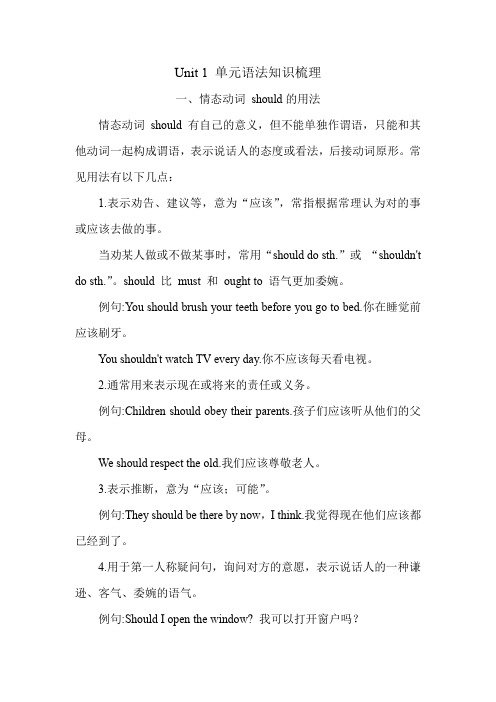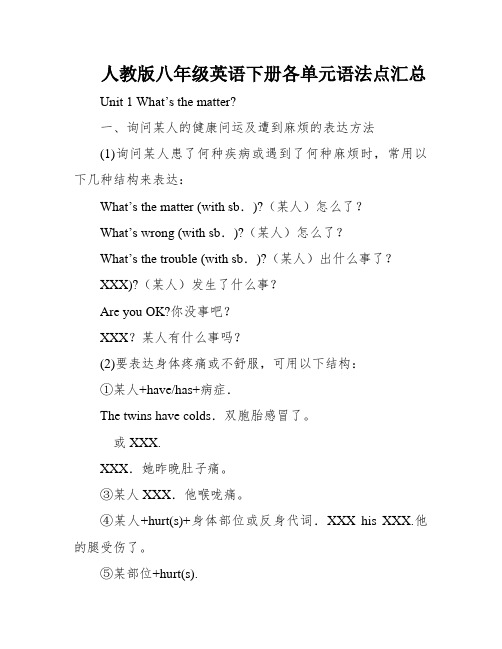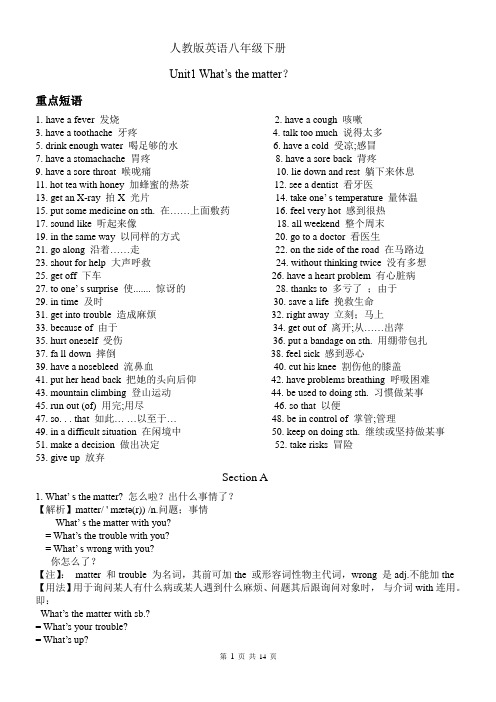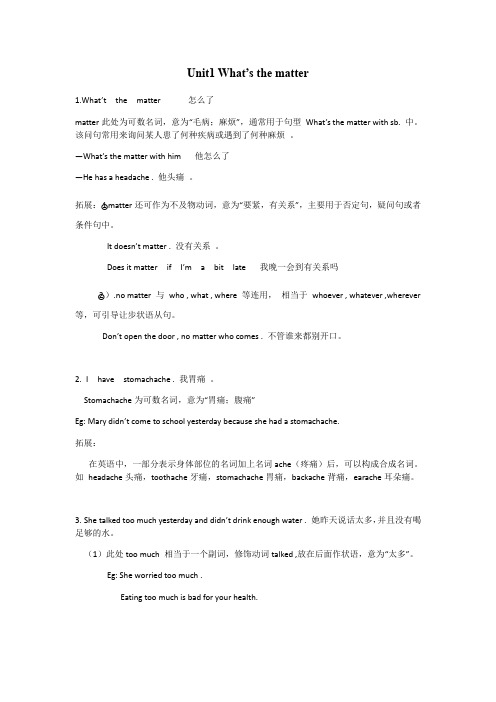人教版八年级下英语unit
最全面人教版八年级下册英语第一单元知识点归纳总结

Unit 1 What's the matter?一、词汇与短语◆重点单词A部分1.matter n. 问题;事情2.sore adj. 疼痛的;酸痛的3.stomachache n. 胃痛;腹痛4.foot n. 脚;足5.neck n. 颈;脖子6.stomach n. 胃;腹部7.throat n. 咽喉;喉咙8.hurt v. (使)疼痛;受伤9.fever n. 发烧10.passenger n. 乘客;旅客11.lie v. 躺;平躺12.break n. 间歇;休息13.rest v. &n. 放松;休息14.onto prep. 向;朝15.X-ray n. X射线;X光16.trouble n. 问题;苦恼17.toothache n. 牙痛18.hit n. (用手或器具)击;打19.headache n. 头痛20.herself pron. (she的反身代词)她自己21.off adv. & prep. 离开(某处);不工作;从……去掉B部分1.bandage n. 绷带v. 用绷带包扎2.press v. 压;挤;按3.sick adj. 生病的;有病的4.knee n. 膝;膝盖5.breathe v. 呼吸6.knife n. 刀7.sunburned adj. 晒伤的8.blood n. 血9.ourselves pron. (we反身代词)我们自己10.mean v. 意思是;打算11.climber n. 登山者;攀登者12.importance n. 重要性;重要13.risk n.&v. 危险;风险;冒险14.decision n. 决定;抉择15.accident n.(交通)事故;意外遭遇16.control v.&n. 限制;约束;管理17.situation n. 情况;状况18.spirit n. 勇气;意志19.kilo( = kilogram) n. 千克;公斤20.death n. 死;死亡21.rock n. 岩石22.nurse n. 护士◆重点短语A部分1.have a cold 感冒2.lie down 躺下3.have a stomachache 胃痛4.take one's temperature 量体温5.have a fever 发烧6.to one's surprise 使……惊讶的是7.get off 下车8.right away 立即;马上9.take breaks (take a break) 休息10.talk too much 说得太多11.drink enough water 喝足够的水12.have a very sore throat 嗓子非常疼13.get an X-ray 拍X光片14.see a dentist 看牙医15.drink some hot tea with honey 喝一些加蜂蜜的热茶16.put some medicine on sth.在……上面敷一些药17.feel very hot 感到很热18.sound like 听起来像19.all weekend 整个周末20.in the same way 以同样的方式21.go to a doctor 看医生22.go along 沿着……走23.on the side of the road 在马路边24.shout for help 大声呼救25.without thinking twice 没有多想26.have a heart problem 有心脏病27.thanks to 多亏了;由于28.in time 及时29.save a life 挽救生命30.get into trouble 陷入麻烦31.hurt oneself 受伤32.fall down落下;摔倒B部分1.be used to 习惯于……;适应于……2.in a difficult situation 在困境中3.take risks (take a risk) 冒险4.keep on doing sth. 继续(或坚持)做某事5.run out (of) 用尽;耗尽6.make a decision 作出决定7.cut off 切除8.get hit on the head 撞到头部9.get out of 离开;从……岀来10.be interested in 对……感兴趣11.give up 放弃12.mean doing sth. 意味着做某事13.put a bandage on sth. 用绷带包扎…14.lose one's life 失去生命15.feel sick 感到恶心16.mountain climbing 登山运动17.have problems breathing 呼吸困难18.be in control of 掌管;管理◆重点句子A部分1.What's the matter with you?=What's the trouble with you?=What's wrong with you?你怎么了?2.What should she do? 她该怎么办呢?3.Did you fall down? 你跌倒了吗?4.Should I take my temperature? 我应该量一下体温吗?5.I think I sat in the same way for too long without moving.我想我以同样的姿势一动不动地坐得太久了。
人教版英语八年级下册Unit 1-5 单元语法知识梳理

Unit 1 单元语法知识梳理一、情态动词should的用法情态动词should有自己的意义,但不能单独作谓语,只能和其他动词一起构成谓语,表示说话人的态度或看法,后接动词原形。
常见用法有以下几点:1.表示劝告、建议等,意为“应该”,常指根据常理认为对的事或应该去做的事。
当劝某人做或不做某事时,常用“should do sth.”或“shouldn't do sth.”。
should 比must 和ought to 语气更加委婉。
例句:You should brush your teeth before you go to bed.你在睡觉前应该刷牙。
You shouldn't watch TV every day.你不应该每天看电视。
2.通常用来表示现在或将来的责任或义务。
例句:Children should obey their parents.孩子们应该听从他们的父母。
We should respect the old.我们应该尊敬老人。
3.表示推断,意为“应该;可能”。
例句:They should be there by now,I think.我觉得现在他们应该都已经到了。
4.用于第一人称疑问句,询问对方的意愿,表示说话人的一种谦逊、客气、委婉的语气。
例句:Should I open the window? 我可以打开窗户吗?What should we do now? 我们现在该干什么呢?5.表示某种感情色彩,意为“竟会”,常用于以how, why开头引导的特殊疑问句中。
例句:Why should you be so early today? 你今天为什么会如此早?二、反身代词1.反身代词的构成反身代词是一种表示反射或强调的代词。
它由第一人称、第二人称的形容词性物主代词和第三人称代词的宾格加词尾-self或-selves构成。
其构成如下表:反身代词与它所指代的名词或代词形成互指关系,两者在人称和数上应保持一致。
人教版八年级英语下册各单元语法点汇总

人教版八年级英语下册各单元语法点汇总Unit 1 What’s the matter?一、询问某人的健康问运及遭到麻烦的表达方法(1)询问某人患了何种疾病或遇到了何种麻烦时,常用以下几种结构来表达:What’s the matter (with sb.)?(某人)怎么了?What’s wrong (with sb.)?(某人)怎么了?What’s the trouble (with sb.)?(某人)出什么事了?XXX)?(某人)发生了什么事?Are you OK?你没事吧?XXX?某人有什么事吗?(2)要表达身体疼痛或不舒服,可用以下结构:①某人+have/has+病症.The twins have colds.双胞胎感冒了。
或XXX.XXX.她昨晚肚子痛。
③某人XXX.他喉咙痛。
④某人+hurt(s)+身体部位或反身代词.XXX his XXX.他的腿受伤了。
⑤某部位+hurt(s).My head hurts badly.我头痛得厉害。
⑥或人+have/has+a pain+in one’s+身体部位,I have a XXX.我胸口痛。
⑦(The re is)something wrong with one’s+身体部位.There is something wrong with my right eye..我的右眼有毛病。
⑧其他表达体式格局She has a heart trouble.她故意脏病。
He got hit on the head他头部受到了撞击。
XXX finger.她割破手指了。
二神态动词should的用法1.Should为情态动词,意为“应该;应当”,否定式为shouldn’t,其后接动词原形,无人称和数的变化。
常用来表示征询意见、建议、劝告、要求或义务等。
You should drink hot water with honey.你应该喝加有蜂蜜的开水。
He should put his head back他应该把头后仰。
人教版英语八年级下册Unit1-6短语

Unit1重点短语1.have a stomachache胃疼2.have a headache头疼3.have a toothache 牙疼4.have a cold/ fever /cough感冒/发烧/咳嗽5.have a sore back/ throat 背酸疼/ 喉咙疼6.see a dentist 看牙医7.go to (see) a doctor 看医生8.take one’s temperature 量体温9.hot tea with honey 有蜂蜜的热茶10.take some medicine 吃些药11.put a bandage on …把…绑上绷带12.put some medicine on the cut在伤口上撒些药13.get hit on the head 头部受到撞击14.tell sb. (not) to do sth.告诉某人(不)做...15.be used to doing sth. 习惯于做某事used to do sth. 过去常常做某事(现在不)16.take risks/ a risk 冒险17.give up (doing)sth. 放弃(做)某事18.have trouble (in) doing sth.做某事有困难19.hurt oneself doing sth. 做某事伤到自己20.without thinking twice 毫不犹豫21.agree to do sth. 同意做某事agree with sb.同意某人观点agree on sth.就某事达成一致22.be ready to do sth. 准备好做某事23.run out (of) 用尽,耗尽24.cut off 切除25.fall down摔倒26.right away 立即,马上27.get into 陷入,参与28.get out of 离开,从…出来29.need to do sth.需要做某事30.be in control of 掌管,管理31.keep (on) doing sth. 坚持做某事32.make a decision 做决定33.so that 为了,以便so… that…如此,以至于34.think about 考虑,想think over 仔细考虑35.lie down and rest 躺下来休息36.What’s the matter某人怎么了?=What’s the trouble with sb.?=What’s up?= What’s wrong with sb.?37.Are you OK? 你还好吗?Unit2重点短语1.put off(doing)sth. 推迟put on 穿上,上演put out 熄灭put up 张贴,搭建,举起2. give out= hand out分发,散发give away 赠送,捐赠give in 屈服,让步give up (doing) sth.放弃(做)某事3.care for照顾,非常喜欢= take care of= look after4. clean up 打扫5. call up 打电话给… ,征召6. cheer up使变得高兴,振奋起来7. come up with 想出,提出8. set up 建起,设立9. try out (for)参加…选拔10. get a strong feeling of satisfaction获得强烈的满足感11. the look of joy 高兴的样子12. at the age of 在…岁时13. an old people’s home 养老院14. raise money for 为…捐钱15. sth. run out某物用完,耗尽sb. run out of sth. 某人把某物用尽16.take after(有血缘关系外貌,行为)像17. be similar to与…相似the same as 与…相同in the same way 以相同方式18.make a (great) difference to sb.对…有(极大)影响,作用19. need to do sth. 需要做某事20. make a plan for sth.为…制定计划plan to do sth. 制定计划做某事21.be able to do sth.有能力做某事be unable to do sth. 没有能力做某事22. help sb. out 帮助…摆脱困境23. a friend of mine 我的一个朋友24. change one’s life 改变某人生活make a change 做出改变25. be interested in (doing) sth.对(做)..感兴趣26. imagine sb. doing sth. 设想某人做某事27. be busy with sth.忙于...be busy doing sth. 忙于做…28. used to do sth.曾经,过去常常做某事be used to doing sth. 习惯于做某事be used to do sth. 被用来做某事(被动)29.volunteer (one’s time) to do sth.自愿(花时间)做...30.have difficulty/ trouble/ a problem/ problems (in) doing sth. 做某事有困难Unit 3 重点短语1.fold one’s clothes叠衣服2.do the dishes 洗餐具e one’s computer用某人的电脑4.take out the rubbish 倒垃圾5.make the bed整理床铺6.be in a mess 混乱,一团糟7.sweep the floor扫地8.stay out late在外待到很晚9.be angry with sb.生某人的气10.take sb. for a walk带……出去散步11.all the time总是,一直,频繁,反复12.all day一整天all night 一整晚at midnight在午夜13.the next day第二天14.hang out with sb.和…闲逛15.in order (not)to do sth. 以便(不)做某事16.provide sth. for sb= provide sb. with sth.向某人提供某物17.pass sb. sth.= pass sth. to sb. 向..递某物give sb. sth.=give sth. to sb.给某人某物show sb. sth.=show sth. to sb.向..展示...send sth. to sb.=send sth. to sb.把...送给..18.depend on sb./sth. 依靠…It (all) depends.视情况而定19.as a result因此20.take care of=care for =look after照顾21.fall ill病倒22.in surprise惊讶的23.the +比较级,the +比较级越…就越…24.invite sb. to +某地/活动邀请某人去…invite sb. to do sth. 邀请某人做某事25.a waste of time on sth....是一种浪费时间a waste of time (in) doing sth.做...是浪费时间26.food and drinks 吃的和喝的snacks and drinks 零食和饮料27.as soon as= the minute一...就…主将从现28.neither …nor …既不…也不…(就近)either … or…两者之一(就近)both… and…两者都(谓复)29.borrow sth. from sb./sp.从...借入某(短)lend sb. sth.= lend sth. to sb.把...借给..(借出)keep + 一段时间(since, for)保留,保存(延)30.hate to do / doing sth. 讨厌做某事31.mind doing sth. 介意做某事32.It’s one’s job/ duty to do sth.做某事是某人的工作/ 职责Unit4重点短语1.allow sb. to do sth.允许某人做某事sb. be allowed to do sth. 某人被允许做某事2.look through快速查看,浏览3.deal with 处理,应对4.big deal 重要的事5.work out 解决,成功地发展6.get on / along (well) with sb.和睦相处7.fell lonely 感到孤独8.all the time 一直9.copy one’s homework 抄某人作业10.the relations between A and BA和B之间的关系11.hang out with sb. 与某人闲逛12.argue with sb.(about sth.) 因...与..争吵13.instead of 反而,代替14.feel / be nervous 感到紧张municate with sb. (about sth.)和某人交流(某事)16.firstly, secondly, thirdly, fourthly… lastly 第一,第二,第三,第四…最后17.explain sth. to sb. 向某人解释某事/物18.return sth. to sb. 把某物归还给某人19.not … anymore 不再…20.the/ a member of …的成员pete with sb. 和某人竞争competition n.比赛singing competition歌唱比赛pare A with B 将A与B进行比较compare A to B 把A比成B23.in one’s opinion 以某人的观点24.so that+ 从句目的是,为了so + adj./ adv that +从如此…以至于…25.in order to do sth. 为了…in order that+从句为了…26.not … until…直到…才27.send sth. to sp. 把某物送到某地28.cut out 删除,删去cut down 消减,砍倒cut up 切碎cut off 中断切断cut in 插嘴29.angry adj.生气的angrily adv. 生气地be angry with sb. 生某人的气be angry about/ at sth. 对…生气Unit5重点短语1.at the time of 在…的时候2.go off(闹钟)发出响声,离开,变质,爆炸3.take a hot shower 洗个热水澡4.pick up接电话,捡起,获得,搭载,开车接...,偶然学会=answer the phone接电话5.wait for sb./ sth. 等待…6.feel like (doing) sth.想要做..,感觉像…7.beat +sb.(对手) 击败,打败win+sth.(比赛,奖品) 赢得…8.fall asleep 进入梦乡,睡着(无意识入睡)sleep 睡觉,+(时间段)go to sleep 睡着,入睡,(入睡的动作)go to bed 就寝,上床睡觉,(上床准备睡觉这一动作)9.by the side of 在…旁边10.make one’s way 前往,费力地前往on one’s way 在去...的路上11.basketball competition 篮球比赛12.make sure 确认,查明,核实,确保13.walk by 路过14.point out 指出15.go away 消失,离开16.be important to sb. 对某人很重要17.make sure 确保,确信18.hear from sb.收到某人的来信hear of/ about +sb./ sth. 听说…hear +that从句听说…hear sb. do sth. 听到某人做某事hear sb. doing sth. 听到某人正在做某事sb. be heard to do sth.某人被看到做某事19.in silence 沉默,无声keep silent 保持沉默20.be in health健康keep healthy 保持健康21.stop to do sth.停下来去做某事(另一件)stop doing sth. 停止做某事(正做的事)22.die down 逐渐变弱,逐渐消失23.beat against 撞上,打上24.have meaning to sb.对…有意义25.take down拆除,记录,往下拽26.too, as well,(口),用于肯定句,疑问句句末too前用,隔开also (正式)多用于肯定句,疑问句句中,be后实前either 多用于否定句句末,一般前用,隔开27.While John was cleaning his room, Mary turned on the radio.= John was cleaning his room when Mary turned on the radio. when, while “当……时候”(1)when既可表示时间点,也可以表示时间段.其谓语动词是延续性/非延续性的,与主句中的谓语动词同时发生,也可在其后发生.(2)while只表示时间段,谓语动词只能是延续性的,且与主句中的谓语动词同时发生.(3)while引导的时间状语从句多用过去进行时,而when引导的时间状语从句多用一般过去时.Unit6重点短语1. a little bit = kind of =a little 有点;稍微2. instead of+n./pron. /v-ing.代替,反而,而不是instead + 句子,代替,反而(句首/句末)3. turn ... into = change…into把…变成…4. once upon a time=long long ago = a long time ago 从前5. fall in love with 爱上,喜欢上……6. get married (to sb.)= marry ab.与..结婚(短) be married (to sb.) 与…结婚+时间段7. a couple of 一对,一些,几个8. for the first time 首次;第一次9. come out 出来;出版,上映,冲洗照片10. wake up 醒来11.walk around 四处走走12. work on 从事(某工作);致力于13. remind sb. (not)to do sth.提醒某人(不)做某事remind sb. of sth. 使某人想起某事remind sb. that+从句提醒某人…14. lead sb. to ... 带领某人去……lead sb. to do sth.致使,引导某人做某事lead to (道路)通往…,引起…15. be made of 由…组成看得出原材料be made from 由…构成,看不出原材料16. be able to do sth. 有能力,能够做某事17. in the moonlight 在月光下18. make a plan 制定一个计划plan to do sth. 计划做某事19. get /be lost 迷路=lose one’s way20.take away 拿走,取走take off 脱下,起飞take up 占据,开始从事take place (有计划地)发生21. look like 看起来像…(外貌)be like 多指性格像,有时也指外貌take after (有血缘关系)像…22. the next day第二天25.continue to do sth. 继续去做另一件事continue doing sth.继续去做同一件事26.think about 考虑,认为think up 想出,设计出,发明think of 考虑到,想到26.What do you think of/about + ... ?=How do you like+ n. /pron/v-ing?你认为…怎样?25. It doesn’t seem very possible to move a mountain. It doesn’t seem + adj. + to do 做…似乎是.. Grammar:unless意为“除非;如果不”,+条件状语从句。
人教版八年级英语下册-Unit-...

人教版八年级英语下册-Unit-...Unit 3 Could you please clean your room 重点词组Section Ado chores 做家务do the dishes 洗碗sweep the floor 扫地take out the rubbish 扔垃圾make the bed 铺床fold the clothes 叠衣服clean the living room 打扫客厅no problem 没问题go out for dinner 出去吃晚饭go to the movies 去看电影stay out 待在外头(不在家)get a ride 骑车have to do sth. 不得不做。
need to do sth. 需要做。
do some work 做一些工作eat breakfast 吃早饭have a basketball game 举行一场篮球赛work on sth. 使用。
工作help out with 帮助解决a few 一点点at least 至少finish doing sth. 完成做某事want sb. to do sth. 想要某人做某事so much 这么多be back 回来any minute 随时/马上clean and tidy 干净整洁be angry with 对某人生气solve the problem 解决问题throw down 扔下in front of 在。
前面come over 过来take...for a walk 带。
去散步all the time 一直all day 整个白天do housework 做家务all evening 整个夜晚shout back 吼叫还击walk away 走开come home from work 下班回家in surprise 惊讶地share the housework 分担家务sit down 坐下hang out 出去玩help sb. (to) do sth. 帮助某人做某事how much 多少come back 回来try (not) to do sth. 努力(不)做某事hate to do sth. 讨厌做某事Section Bask sb. to do sth. 让某人做某事next to 靠近have a party 参加派对have a test 参加考试mean doing sth. 意味着。
人教版英语八年级下册unit1单元知识点归纳总结

人教版英语八年级下册Unit1 What’s the matter?重点短语1.have a fever 发烧2. have a cough 咳嗽3. have a toothache 牙疼4. talk too much 说得太多5. drink enough water 喝足够的水6. have a cold 受凉;感冒7. have a stomachache 胃疼8. have a sore back 背疼9. have a sore throat 喉咙痛10. lie down and rest 躺下来休息11. hot tea with honey 加蜂蜜的热茶12. see a dentist 看牙医13. get an X-ray 拍X 光片14. take one’ s temperature 量体温15. put some medicine on sth. 在……上面敷药16. feel very hot 感到很热17. sound like 听起来像18. all weekend 整个周末19. in the same way 以同样的方式20. go to a doctor 看医生21. go along 沿着……走22. on the side of the road 在马路边23. shout for help 大声呼救24. without thinking twice 没有多想25. get off 下车26. have a heart problem 有心脏病27. to one’ s surprise 使....... 惊讶的28. thanks to 多亏了;由于29. in time 及时30. save a life 挽救生命31. get into trouble 造成麻烦32. right away 立刻;马上33. because of 由于34. get out of 离开;从……出萍35. hurt oneself 受伤36. put a bandage on sth. 用绷带包扎37. fa ll down 摔倒38. feel sick 感到恶心39. have a nosebleed 流鼻血40. cut his knee 割伤他的膝盖41. put her head back 把她的头向后仰42. have problems breathing 呼吸困难43. mountain climbing 登山运动44. be used to doing sth. 习惯做某事45. run out (of) 用完;用尽46. so that 以便47. so. . . that 如此… …以至于…48. be in control of 掌管;管理49. in a difficult situation 在闲境中50. keep on doing sth. 继续或坚持做某事51. make a decision 做出决定52. take risks 冒险53. give up 放弃Section A1. What’ s the matter? 怎么啦?出什么事情了?【解析】matter/ ' mætə(r)) /n.问题;事情What’ s the matter with you?= What’s the trouble with you?= What’ s wrong with you?你怎么了?【注】:matter 和trouble 为名词,其前可加the 或形容词性物主代词,wrong 是adj.不能加the 【用法】用于询问某人有什么病或某人遇到什么麻烦、问题其后跟询问对象时,与介词with连用。
人教版英语八年级下unit1讲解与练习

Unit1 What’s the matter1.What’t the matter 怎么了matter此处为可数名词,意为“毛病;麻烦”,通常用于句型What’s the matter with sb. 中。
该问句常用来询问某人患了何种疾病或遇到了何种麻烦。
—What’s the matter with him 他怎么了—He has a headache . 他头痛。
拓展:○1matter还可作为不及物动词,意为“要紧,有关系”,主要用于否定句,疑问句或者条件句中。
It doesn’t matter . 没有关系。
Does it matter if I’m a bit late 我晚一会到有关系吗○2).no matter 与who , what , where 等连用,相当于whoever , whatever ,wherever 等,可引导让步状语从句。
Don’t open the door , no matter who co mes . 不管谁来都别开口。
2. I have stomachache . 我胃痛。
Stomachache为可数名词,意为“胃痛;腹痛”Eg: Mary didn’t come to school yesterday because she had a stomachache.拓展:在英语中,一部分表示身体部位的名词加上名词ache(疼痛)后,可以构成合成名词。
如headache头痛,toothache牙痛,stomachache胃痛,backache背痛,earache耳朵痛。
3.She talked too much yesterday and didn’t drink enough water . 她昨天说话太多,并且没有喝足够的水。
(1)此处too much 相当于一个副词,修饰动词talked ,放在后面作状语,意为“太多”。
Eg: She worried too much .Eating too much is bad for your health.(2)此处enough为形容词,意为“足够的”。
人教版八年级英语下册Unit 1—2 必背短语及句子

Unit 1 what’s the matter?必背词组1. have/get a headache =headache hurts头痛2. have/get a stomachache= stomachache hurts胃痛3. have/get a toothache = toothache hurts牙痛4. have/get a very sore throat = throat hurts a lot喉咙痛5. have/get a sore back = back hurts背痛6. have/get a sore leg = leg hurts腿痛(伤)7. have a fever发烧8. have colds =have a cold感冒9. have a nosebleed流鼻血10. have a cough咳嗽11. have a heart problem心脏病12. have the same spirit as Aron和Aron有一样的精神13. had a serious mountain climbing accident遇到了严重的登山事故14. get into trouble遇到麻烦15. get hit on the head撞到了头16. get out of….从……出来;远离……lie down and rest躺下休息17. rest for a few days休息几天18. have a rest = take a rest进行休息19. have a break=take a break (短暂的)休息20. get some sleep睡觉21. get some rest休息22. expected most or all of the passengers to get off and wait for the next bus. 期待绝大多数或全部的乘客下车去等下一班车23. see a dentist and get an X-ray去看牙医并照片24. drink some hot tea with honey喝加了蜜的热茶25. take one’s temperature给某量体温26. take good care of myself好好照顾自己27. take the man to the hospital把这个人送到医院28. move the man to onto the bus把这个人般到公共汽车上29. need to take breaks away from the computer有必要不沾计算机一段时间30. put some medicine on the cut在伤口上敷药31. put a bandage on the finger把创可贴绷在手指上32. put your head back把头往后仰33. put on my jacket穿上我的夹克34. move my neck转动我的颈子35. played computer games all weekend整个周末都玩电脑游戏36. stopped the bus without thinking twice没有细想就停了车37. stop the blood止血38. hurt yourself playing soccer在踢足球时伤了你自己39. found himself in a very dangerous situation when climbing in Utah.在犹他州爬山时发现自己处于非常危险的景地40. cut myself by accident偶然砍伤了我自己41. have to act quickly必须赶快行动42. thanks to Mr. Wang and the passengers多亏了王先生和乘客们43. saved the man in time及时救了这个人的命44. an American man who is interested in mountainclimbing一个对爬山感兴趣的美国人45. one of the exciting things刺激的事情之一46. almost lost his life because of accidents因为事故几乎失去了他的生命47. climbed down the mountain下山48. the importance of making good decisions作好决定的重要性49. be in control of one’s life把握生命50. make a decision that could mean life or death做出生死抉择51. Aron ran out of water.= Aron’s water ran out. Aron喝光了水52. ate too much junk food at my friend’s birthdayparty在朋友的生日party上吃了太多垃圾食品53. to one’s surprise,…令某人吃惊的是……54. agreed to go with him同意和他一起去55. hit an old man撞到一个老人56. right away立刻,马上57. right now刚才58. fall down 倒下,摔倒59. run it under water用水冲60. tell of/about…讲述……61. still go mountain climbing依然去爬山62. doesn’t mind taking risks不介意冒险63. give up放弃64. an all-you-can-eat meal所有东西都好吃的一餐65. run under the hot sun在毒辣的太阳下跑66. be used to doing something习惯于做……必背句子1. What’s the matter( with you)?=What’s wrong( with you)?=What is happening (to you)?怎么了?2. What should I do?我应该做什么呢?/我该怎么办呢?3. Should I take my temperature? No, you shouldn’t. /Yes, youshould.我应该测量体温吗?不,你不应该。
- 1、下载文档前请自行甄别文档内容的完整性,平台不提供额外的编辑、内容补充、找答案等附加服务。
- 2、"仅部分预览"的文档,不可在线预览部分如存在完整性等问题,可反馈申请退款(可完整预览的文档不适用该条件!)。
- 3、如文档侵犯您的权益,请联系客服反馈,我们会尽快为您处理(人工客服工作时间:9:00-18:30)。
Unit 5 What were you doing when the rainstorm came?1)学习并掌握下列单词:rainstorm, alarm, go off, begin (began), heavily, suddenly, pick up (the phone), strange2)能正确使用以下常用表达:be busy doing, so… that, wake up, pick up, wait for, look for, at the time of …3)能熟练掌握并使用下列重点句式:(1)—What was the girl doing at the time of the rainstorm? —She was …(2)—What were you doing last night? — I was ...(3) While you were sleeping, I called Jenny and she helped me.(4) When you called, I was taking a shower.Grammar:1)复习现在进行时:He’s …doing the homework in the housereading in the librarywaiting for the bus at the bus stopwalking home on the street(2) 总结现在进行时的构成:is/ am/ are + doing…(3) 总结现在分词的构成:一般:waiting, studying, playing去e:moving, having双写:running, shoppingie 结尾的,把ie 变成y 加上ing过去进行时(1) 过去进行时的构成:was/ were doing(2) 过去进行时表示在过去某一时刻或某一段时间正在进行的动作。
肯定句:主语+ was/ were doing + …否定句:主语+ was/ were + not doing + …一般疑问句:Was/ Were + 主语+ doing + …?探究when 与while的区别观察表格中的句子,探究when 与while的区别:◎when的含义是at or during the time that,既可用于指一点时间(从句的谓语动词需用终止性动词),也可用于指一段时间(从句的谓语动词用延续性动词),从句与主句里面的谓语动词所表示的动作或状态能同时发生,或一先一后发生。
He wants to help people when they are ill.他想在人们生病的时候帮助他们。
When he got to Shanghai, the ship had already set off.他到达上海时,轮船已经开走了。
◎while的含义是during the time that,只能用于指一段时间(从句的谓语动词必须是延续性的),从句与主句里面的谓语动词所表示的动作只能同时发生,不能一先一后发生。
While I was reading, my mother was washing clothes.我读书时,妈妈在洗衣服。
While 还有然而的意思,表示转折I like apples while my sister likes pears.(三)、另外,when和while的区别还在于:while引导的时间状语从句多用进行时态,而when引导的时间状语从句多用一般时态。
I was doing my homework last night when it rained.The bell rang while Mom was listening to music.例句:1) While Ben’s mom was making sure the radio was working, his dad was putting pieces of wood over the windows.2) Ben was helping his mom make dinner when the heavy rain finally started.3) When Ben finally fell asleep at 3:00 a.m., the wind was dying down.4While I was making my breakfast, my brother was listening to the radio.5When we got to the place of the accident, the car was in bad shape from hitting a tree.知识点:1.go off(铃声)响起My alarm clock didn’t go off.拓展go off“离开,逃走,私奔,(食物)变坏”The speaker has gone off the subject.(离开)Bob went off alone and has not returned.Meat went off quickly in hot weather.My alarm clock didn’t _____this morning.I was late for class.A.work outB.go onC.break downD.go off2.pick up接电话、拾起,捡起Pick up pick sth up.如果是人称代词,必须放在中间Please pick up your toys. We’ll go to the farm to pick up some apples. 拓展pick up还有“搭载,让人乘车,改善,取回”的意思。
The bus stopped and picked up some passengers.Please pick up my coat for me.I called you yesterday,but you didn’t pick up.Karin found some waster paper on the floor.She ______it ______and threw it into the dustbin.4.make sure查明,确信Make sure that you’ve made no mistakes.Go and make sure of the time and place.拓展sure的常见搭配Be sure of对……有把握I’m quite sure of your kindness.Be sure+宾语从句I’m sure that she’ll win the game.I’m not sure if they will return or not.Be sure to一定,必定He’s sure to succeed.Read your English paper again and______there is no mistake in it before you hand it in.A.make sureB.turn upe outD.look for5.Ben was helping his mom make dinner when the rain began to beat heavily against the windows.(1)beat在本句中表示“敲打”,还可表示“(心脏)等跳动”,beat+人“打败某人”We beat them by 2 to 1.Do you think the Stars will beat the Bulls?His heart is still beating.拓展win “赢,获胜” +game,war,match,prize 过去式,过去分词won,现在分词winning. I always win a prize.(2)against 作介词“反对,迎着,顶着,易考,以……为背景”We are for for peace and against war.It’s very hard to walk against the wind.Against your last grade,it increased by 20.Don’t stand against the wall.Class Five ____us and _____the football match yesterday.A.beat,winB.win,beatC.beat,wonD.won,beat根据句意及首字母提示完成句子。
The Lakes will play a________the Rockets in the NBA match tonight. ——Can you teach me how to fly a kite? ——Sure,It’s easy,Just do it a_______ the wind.6.at first起初,刚开始的时候He worked hard at first ,but later did nothing.At first,I didn’t like English ,but now I do.I think English is hard for me,_______.I don’t know the grammar.A.At firstB.First of allC.Not at all.D.In allfirst of all 首先7.He finally fell asleep when the wind was dying down at around 3:00 am. (1)fall asleep “入睡”,fall用作系动词,asleep作表语Fall asleep侧入睡的动作。
Be asleep 侧重入睡的状态。
He fell fast asleep because of being tired.He was asleep when I saw him.(2)die down “逐渐减弱”=dropThe winds dropped.=The winds died down.The sound died down slowly.拓展die of因……致死He died of a disease. We’re all dying for a drink.(1)I_______while reading the English textbook.Luckily ,my classmate woke up in time!A.had fallen asleepB.have fallen asleepC.fell asleepD.fall asleep(2)Until the strong wind_______,they didn’t go out.A.died downB.died fromC.died forD.die of8.When he woke up,the sun was rising .(1)wake “醒过来” wake up“叫醒”Please wake me up at 6:00 am tomorrow morning.Don’t wake up your dad.=Don’t wake your dad up.(2)rise作不及物动词,“上升,上涨;起立,起床”主语自身移到较高的位置。
